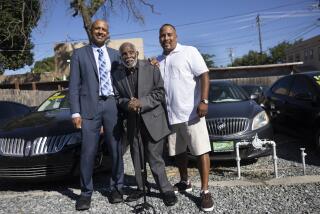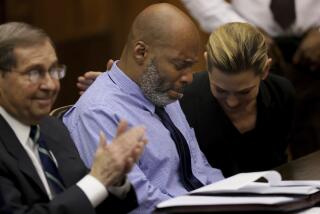Jailed Arms Dealer Could Be Released Early, Judge Rules
WASHINGTON — A judge’s decision to overturn one of former CIA operative Edwin Wilson’s three convictions could mean that the once globe-trotting arms dealer will be a free man by 2005, and possibly earlier, sentencing experts said Wednesday.
Federal officials said they were evaluating whether to appeal a ruling late Monday by U.S. District Judge Lynn Hughes in Houston that overturned Wilson’s 1983 conviction for selling tons of plastic explosives to Libya. The judge found that prosecutors knowingly had used false testimony and had hidden evidence that was helpful to the defense.
Wilson was part of a generation of Cold War-era CIA operatives that included several people who were involved in the 1980s arms-for-hostages trade scandal known as the Iran-Contra affair.
He parlayed a career running front companies for the agency into a lucrative worldwide, arms-trading business after he retired from the CIA in 1971.
The government alleged that Wilson’s exploits ultimately spun out of control. His arms sales to Libya led to convictions in Texas and Virginia.
In New York, he was convicted of trying to hire a convicted murderer to kill two prosecutors who were pursuing him. He was sentenced on all three convictions for a total of 52 years in prison, to be served consecutively.
Now 75, Wilson has been incarcerated since 1982. Housed at a federal facility in Pennsylvania, he is not scheduled for release until 2014.
Assuming it survives any government appeal, Hughes’ ruling would shave years off Wilson’s sentence. The now-voided conviction in Texas carried a 17-year term. Wilson also stands to earn years of credits under an early-release program, by which inmates get an automatic reduction in sentence for time they spend without being written up for violating prison rules, among other factors.
If the ruling stands, “by operation of law ... he is going to get out sometime in 2005,” estimated Tom Hutchison, a spokesman for the U.S. Parole Commission. The commission has the discretion to parole Wilson even sooner, he added.
Hughes’ ruling marked a degree of vindication for Wilson, who had spent years filing Freedom of Information Act requests from his prison cell to unearth documents related to his case.
His primary defense at trial was that his dealings with Libya were done with at least the tacit approval of his former employer. The government countered with a three-page affidavit from a top CIA official that suggested he had not performed any services for the agency after he retired. One juror in the Texas case later called the affidavit a crucial piece of evidence; an hour before reaching a verdict, the jury asked the judge to reread it to them.
But government documents later discovered by Wilson and his court-appointed lawyer showed that prosecutors knew the affidavit was “inaccurate.” They produced CIA records showing scores of contacts between the agency and Wilson during the time the government had insinuated that there were none.
None of the documents showed that the CIA had asked him to sell 20 tons of C-4 plastic explosive to Libya -- the nub of the federal charge against him. But Hughes ruled that the affidavit was so crucial in the decision to convict Wilson that the verdict should be thrown out.
“With their knowledge of the nature of Wilson’s work for the CIA, they deliberately deceived the court,” Hughes wrote in his opinion.
The government argued that there was sufficient other evidence to uphold the conviction and denied knowingly using a false affidavit.
Bryan Sierra, a Justice Department spokesman, said Wednesday that the government had not yet decided whether to appeal or to retry Wilson. “We are studying our options,” he said.
E. Lawrence Barcella Jr., a Washington lawyer and former prosecutor who helped spearhead the case against Wilson, only to be targeted by Wilson in the murder-for-hire plot, called the ruling “unfortunate.”
“Does it prove he did not ship 20 tons of C-4 to [Libyan leader Moammar] Kadafi or that he was authorized to do that by the CIA?” he asked. “He was never authorized. That was never his defense.”
David Adler, a Houston lawyer who has been representing Wilson since 1997, said that even he was initially skeptical of his client’s claims.
A former CIA officer who was stationed in Africa, Adler said that when he joined the agency in the early 1990s, “people were still speaking badly about” Wilson.
But after poring over 300,000 classified records stored in a Washington vault, Adler said he concluded that the government engaged in misconduct.
“This was a big deal, and they wanted to win at all costs -- the Constitution be damned,” he said, adding that he is considering filing challenges to Wilson’s two other convictions.
Adler described Hughes, a President Reagan appointee, as “a bit of a maverick.”
“He is a true conservative,” Adler said.
“He believes that the role of the judiciary is to keep an eye on the government.”
More to Read
Sign up for Essential California
The most important California stories and recommendations in your inbox every morning.
You may occasionally receive promotional content from the Los Angeles Times.










